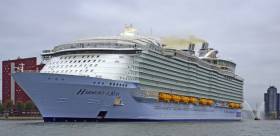Displaying items by tag: Marseille
Crewman Dies In Lifeboat Accident On World's Biggest Cruise Liner
#CruiseLiners - A crewman has died during a safety drill on the world's largest cruise liner in the Mediterranean, as AFP reports.
The Filipino was one of five crew members from the Harmony of the Seas who were on board one of the ship's lifeboats when it suddenly detached from the vessel and fell 10 metres into the water below.
Two others on the lifeboat were hospitalised in critical condition after the incident, which occurred after the 362m ocean liner arrived in the port of Marseille in southern France earlier today (Tuesday 13 September).
It's not yet known how the lifeboat came to detach from the cruise liner, which entered service this past May.
According to Mail Online, the ship was described as a 'floating construction site' on its inaugural voyage.
Passengers reported holes in floors and walls, and accident hazards such as cables, blowtorches and power tools left by contractors on the top deck.
























































